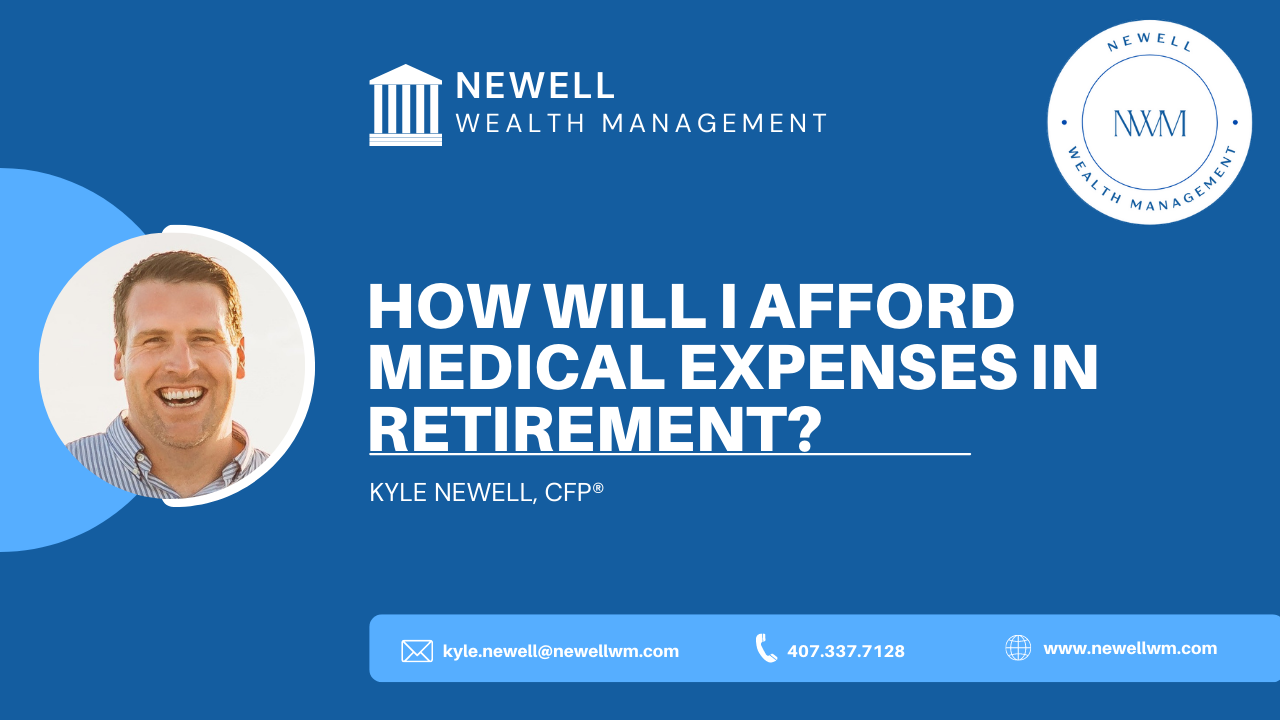How Will I Afford Medical Expenses in Retirement?

$315,000 – That’s a lot of money. A recent study stated that this is the average number a person in retirement could expect to spend on medical expenses. $315,000 is a large enough amount to grab our attention. It is also why many clients I work with that are about to retire, and even some that are already in retirement, worry about medical expenses. No wonder many ask “How will I afford medical expenses in retirement?”
Everyone understands that medical expenses can end up racking up vast amounts of money. Medical debt is one of the main reasons people go into bankruptcy. As you plan for retirement, you need to consider medical expenses, their ramifications, and how to prepare for them appropriately.
A Few Thoughts on Answering How Will I Afford Medical Expenses in Retirement?
1) How can one afford to pay for medical and healthcare expenses in retirement?
Start with the $315,000 and break it down. This is an average, but you also need to consider a person’s lifetime. A person may retire in their mid-60s and live into their 80s, 90s, or longer, depending on their health. This means the $315,000 total number needs to be broken up and considered on a yearly basis rather than the whole.
While the $315,000 garners consideration, it is a little more palatable when you break it up over a 20 or 30-year lifetime. This should give you some assurance when you understand the number is for a total lifespan after retirement, not annually. However, healthcare expenses could still end up being $6,000, $10,000, $12,000, or $15,000 a year depending on different situations.
2) When is your retirement date?
A lot of the costs when it comes to medical expenses depend on when you are planning to retire. The key number there is 65 because, at 65, you’re eligible for Medicare. Many people want to retire before 65 while they’re younger, still able to do things, and hopefully healthier. Retiring early has different calculations than 65 or older. Paying for healthcare is one of the biggest to consider.
3) How will you qualify for insurance if retiring early?
Retiring early, before age 65, means health care costs will be about how you can go into the general insurance marketplace and qualify for insurance according to the Affordable Care Act and depending on your state. Different states have different plans, and there are many nuanced healthcare rules. You’re often looking at the Affordable Care Act or continuing on an employer coverage plan.
Regarding the Affordable Care Act, the costs can add up pretty quickly. The average cost is around $1,000 a month per person, giving or taking many different variables. That number means you could be looking at $10,000 to $12,000 per person per year in healthcare costs if you retire before 65.
There are some ways to get around that, especially around your income. One tip is to look at structuring your income so that you might be able to qualify for some tax benefits and subsidies when it comes to the Affordable Care Act. There are some programs available and some ways to structure your income to potentially mitigate some of those health care costs before 65.
4) What if I retire after 65?
With post-65 retirement, health care costs or medical expenses will be primarily associated with Medicare. The most common types of Medicare are traditional and advantage or supplemental plans.
Traditional Medicare is where you have Part A and Part B. You can fill in different parts and components based on the type of health care coverage you want. This is more of a piecemeal approach. Part A covers your general hospital visits and things of that nature, while Part B covers doctor visits, ambulances, etc. Some people think Medicare covers everything, but that is not the case. This is why Medicare has additional parts for retirees to fill in the gaps with health coverage they may need.
Advantage or supplemental plans mean you have Part A with an integrated supplemental plan that covers everything else. Generally, those are a little bit less expensive because they are more localized and subsidized by the government. You should know that they are not an end-all-be-all either. There are often some restrictions with traveling, in-network, out-of-network, etc.
Nonetheless, once you start Medicare, it’s generally less expensive than just your own personal policy or personal insurance before the Medicare age. The averages, at least for 2022, are around $6,000 or so a year per person for Medicare-related expenses. That will be your prescriptions, doctor’s visits, ongoing premiums, etc. That’s an additional $6,000 a year that you might need to plan for in expenses when it comes to health care. The age you retire is the difference in what you will pay for healthcare expenses.
How do you pay for healthcare?
There are a few options to help pay for healthcare costs in retirement. Some companies offer employee health care benefits that continue after retirement. For example, at one point, Disney offered this type of coverage. When they stopped that offering in the mid-90s, people who started with them after, were no longer eligible for that benefit.
Some of my clients have taken on a part-time job somewhere that offers benefits to part-time workers. This helps them cover healthcare expenses without having to pay out of pocket. The last way to cover the cost is to use your savings and investments. You would add the amount you need for healthcare into your necessary monthly expenses when determining your retirement income needs.
Depending on how close you are to retirement, you may also be able to save into vehicles like a health savings account, which may give you some tax benefits when it comes to health care costs.
The Cost of Aging
One part of health care that’s not included in the $315,000 average is the cost of long-term care, also known as the cost of aging. This cost is not included in the average because there could be hundreds of thousands of dollars a year, depending on the type of care one needs. This is an entirely different subject. For our purposes, we are focused only on discussing your average ongoing health care costs.
The nice thing is that once you have an insurance plan, you know that you will only be liable for a certain amount out of pocket. It helps relieve some anxiety about a potentially catastrophic health event you would be on the hook for. You want to plan appropriately when selecting your plans. Often, with health insurance plans, you can structure a maximum out-of-pocket so that even if something terrible did occur, the insurance company would pick up most of those costs for you.
A client I recently worked with wanted to retire early, around 63. He is single but was concerned about health care costs. He had done a good job saving. He had a bit of cash on hand, some stocks, mutual funds, and a retirement account. We were able to look at his assets and realize that we could generate enough income to cover him until age 65, which would then qualify him for some Affordable Care Act benefits. Health insurance costs were going to go from $800 a month down to around $60 a month because of the nuances of his situation and how we were able to structure his income.
If you are concerned about the cost of healthcare in retirement and what it may look like for you, I’d be happy to chat with you.
Important Information
Newell Wealth Management, LLC (“NWM”) is a registered investment advisor offering advisory services in the State of FL and in other jurisdictions where exempted. Registration does not imply a certain level of skill or training. The presence of this website on the Internet shall not be directly or indirectly interpreted as a solicitation of investment advisory services to persons of another jurisdiction unless otherwise permitted by statute. Follow-up or individualized responses to consumers in a particular state by NWM in the rendering of personalized investment advice for compensation shall not be made without our first complying with jurisdiction requirements or pursuant an applicable state exemption.
All written content on this site is for information purposes only and is not intended to provide specific advice or recommendations for any individual. Opinions expressed herein are solely those of NWM, unless otherwise specifically cited. Kyle Newell and NWM are neither an attorney nor an accountant, and no portion of this website content should be interpreted as legal, accounting or tax advice. Material presented is believed to be from reliable sources and no representations are made by our firm as to other parties’ informational accuracy or completeness. There is no assurance that the views or strategies discussed are suitable for all investors or will yield positive outcomes. Investment involves risks including possible loss of principal and unless otherwise stated, are not guaranteed. Any economic forecasts set forth may not develop as predicted and are subject to change. All information or ideas provided should be discussed in detail with an advisor, accountant or legal counsel prior to implementation.
